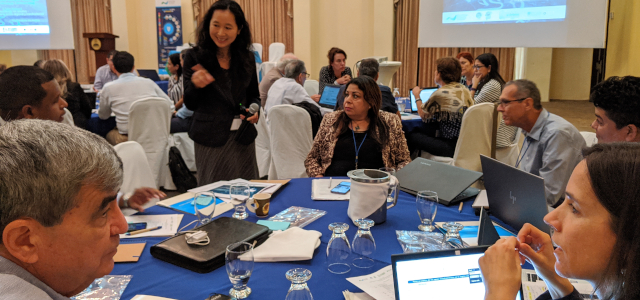The Central American Commission for Environment and Development (CCAD) and GWP Central America, with the support of the IW:LEARN programme of the Global Environment Facility (GEF), held this event as part of a process to identify actions in response to priorities established in the CCAD Water Agenda and also to the requests of countries to promote improved management of transboundary waters.
The workshop was attended by 53 participants from Mexico, the Dominican Republic, Belize, Guatemala, El Salvador, Honduras, Nicaragua, Costa Rica and Panama, representing the Ministries of Foreign Affairs and Ministries of Environment, as well as cross-border commissions or basin organisations, officers of multilateral organisations and cooperation agencies, academics, NGOs, private companies, among others.
The Dialogue entertained discussions in 3 key areas: 1) possible area of collaboration among neighboring countries 2) how to move forward with the dialogue and 3) possible development of regional protocols/agreements on transboundary water.
The specific objectives of the workshop were:
- For the Central American ministers to provide input for establishing guiding principles for the Regional Dialogue and Community of Practice on Transboundary Water Management in Central America.
- For countries to contribute ideas for the establishment and operation of a Community of Practice on Transboundary Water Management in Central America, as a mechanism for coordination and learning.
- Getting an improved understanding of the opportunities and benefits of transboundary water management through specific examples with case presentations.
- Contributing to the generation of updated information on transboundary basins in the region.
All work groups in the workshop considered that the Regional Dialogue and the Community of Practice is a relevant mechanism, and that its objectives should revolve around the identification of common priorities, the exchange of information, as well as contributing to the design of management instruments.
It should be noted that the event was held in parallel to the CCAD Council of Ministers, which enabled a high-level segment with the participation of Ministers of the Environment of Central America, as part of the workshop.
Milciades Concepción, Minister of Environment of Panama (Mi Ambiente) talked about the importance of alliances at the regional level to influence global forums - instances such as the Regional Dialogue are vital for the consolidation of these alliances. He also highlighted how the Regional Dialogue fits into other objectives such as Sustainable Development Goal 17 (SDG 17), also that joint efforts allow greater benefits for countries, for example technical assistance or financing possibilities.
In his closing remarks, Salvador Nieto of CCAD said that the Council of Ministers discussed the issue and expressed the importance of establishing periodic mechanisms on a permanent basis to address transboundary water management in the context of the Central American integration. In addition, he stressed that as CCAD there is a political and technical commitment to report all the lessons learned from the workshop in high-level forums, as well as all available spaces as a next step.
Photo: GWP Senior Network Specialist Yumiko Yasuda talking to workshop participants

